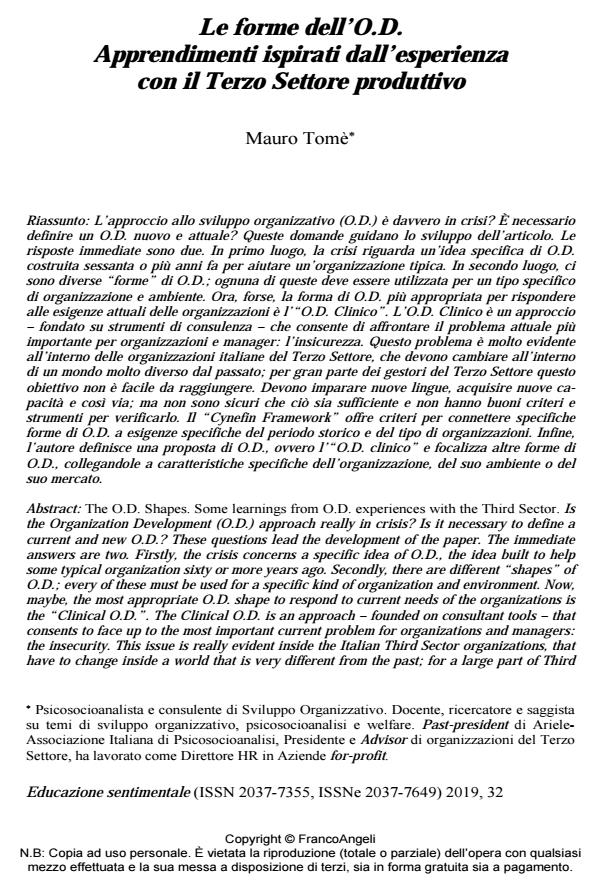Le forme dell’O.D. Apprendimenti ispirati dall’esperienza con il Terzo Settore produttivo
Titolo Rivista EDUCAZIONE SENTIMENTALE
Autori/Curatori Mauro Tomè
Anno di pubblicazione 2020 Fascicolo 2019/32
Lingua Italiano Numero pagine 19 P. 108-126 Dimensione file 441 KB
DOI 10.3280/EDS2019-032005
Il DOI è il codice a barre della proprietà intellettuale: per saperne di più
clicca qui
Qui sotto puoi vedere in anteprima la prima pagina di questo articolo.
Se questo articolo ti interessa, lo puoi acquistare (e scaricare in formato pdf) seguendo le facili indicazioni per acquistare il download credit. Acquista Download Credits per scaricare questo Articolo in formato PDF

FrancoAngeli è membro della Publishers International Linking Association, Inc (PILA), associazione indipendente e non profit per facilitare (attraverso i servizi tecnologici implementati da CrossRef.org) l’accesso degli studiosi ai contenuti digitali nelle pubblicazioni professionali e scientifiche.
L’approccio allo sviluppo organizzativo (O.D.) è davvero in crisi? È necessario definire un O.D. nuovo e attuale? Queste domande guidano lo sviluppo dell’articolo. Le risposte immediate sono due. In primo luogo, la crisi riguarda un’idea specifica di O.D. costruita sessanta o più anni fa per aiutare un’organizzazione tipica. In secondo luogo, ci sono diverse "forme" di O.D.; ognuna di queste deve essere utilizzata per un tipo specifico di organizzazione e ambiente. Ora, forse, la forma di O.D. più appropriata per rispondere alle esigenze attuali delle organizzazioni è l’"O.D. Clinico". L’O.D. Clinico è un approccio - fondato su strumenti di consulenza - che consente di affrontare il problema attuale più importante per orga-nizzazioni e manager: l’insicurezza. Questo problema è molto evidente all’interno delle organizzazioni italiane del Terzo Settore, che devono cambiare all’interno di un mondo molto diverso dal passato; per gran parte dei gestori del Terzo Settore questo obiettivo non è facile da raggiungere. Devono imparare nuove lingue, acquisire nuove capacità e così via; ma non sono sicuri che ciò sia sufficiente e non hanno buoni criteri e strumenti per verificarlo. Il "Cynefin Framework" offre criteri per connettere specifiche forme di O.D. a esigenze specifiche del periodo storico e del tipo di organizzazioni. Infine, l’autore definisce una proposta di O.D., ovvero l’"O.D. clinico" e focalizza altre forme di O.D., collegandole a caratteristiche specifiche dell’organizzazione, del suo ambiente o del suo mercato.
Parole chiave:Forma, insicurezza, O.D. Clinico, terzo settore, ambiente, consulenza, organizzazione, cliente
Mauro Tomè, Le forme dell’O.D. Apprendimenti ispirati dall’esperienza con il Terzo Settore produttivo in "EDUCAZIONE SENTIMENTALE" 32/2019, pp 108-126, DOI: 10.3280/EDS2019-032005